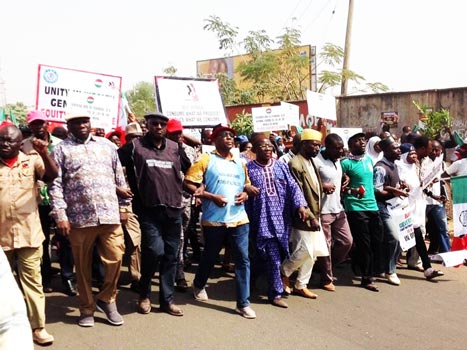
Labour unions in Nigeria comprising the Nigeria Labour Congress (NLC), Trade Union Congress (TUC), and United Labour Congress (ULC) on Thursday mobilized their members to begin a warning strike to press home their demand for a new minimum wage initially pegged at ₦65, 500 across board.
The NLC President, Ayuba Wabba had on Wednesday, addressed a press conference where he said the strike had become necessary because of government’s insincerity to implement the wage increase.
“These are clear signs that the government is not ready for a new national minimum wage. It has only been taking workers for a ride, it has only been taking advantage of workers’ misplaced abiding faith or trust. Given this circumstance, this warning strike is absolutely necessary. It is a precursor to the main strike which will be the mother of all strikes.”
Declaring the strike, he said: “Members of the organized labour would want to formally inform all employers of labour and Nigerians that beginning from midnight, Wednesday, September 26, 2018, workers from all sectors of the economy and our civil society allies will begin a nation-wide warning strike action over the refusal of the Federal Government to reconvene the meeting of the Tripartite National Minimum Wage Committee to enable it conclude its work.
“The action is in compliance with the decision of the various organs of the organised labour which endorsed the 14-day ultimatum served on the Federal Government by members of the organised labour who are members of the Tripartite Committee on the new National Minimum Wage.
“The labour organs further mandated the leadership to take all necessary steps including a warning strike in the first instance to compel the government to reconvene the meeting of the committee in order to bring it to a logical conclusion.
“In compliance with this mandate, all workers in the public and private sectors at all levels across the country have been directed to comply. Industrial unions, state councils, all worker organizations and our civil society allies have been directed to step up mobilization of their members.
“All public and private institutions, offices, banks, schools, public and private business premises including filling stations are to remain shut till further notice. All those who mean well for this country are to see to the success of this action.
“Furthermore, this action is to remain in force until further directives are given.”
The strike is the culmination of the breakdown of talks between the Federal Government, the Tripartite Committee on the new National Minimum Wage chaired by former Minister of Housing and Urban Development, Ama Pepple and the union leaders.
The unions are also aggrieved that the tripartite meeting was suspended indefinitely by the Federal Government, even after the Minister of Labour and Employment had assured that the wage bill would take effect from September 2018.
Outcome of the meeting indicated that the organized private sector had settled for ₦25,000 while other unions had, on behalf of their members, settled for ₦43,000 as the least they could accept.
Recall that Vice President Yemi Osinbajo had last week invited some cabinet ministers and heads of revenue generating agencies to the Presidential Villa to deliberate on the feasibility of implementing the new wage bill under the current administration.
Present at the meeting were the ministers of Finance, Zainab Ahmed; Budget and National Planning, Udoma Udo Udoma; Industry, Trade and Investment, Okechukwu Enelamah; Labour and Employment, Chris Ngige and Minister of State for Petroleum, Ibe Kachukwu.
Also present were the Executive Chairman, National Salaries, Incomes and Wages Commission, Richard Egbule; Director General, Budget Office, Ben Akabueze, and Comptroller General (CG) of the Nigeria Customs Service (NCS), Hameed Ali.

INEC Rejects Petition To Recall Senator Natasha Akpoti-Uduaghan
President Tinubu Set To Depart For Two-Week Working Visit To Paris
Tinubu Reconstitutes NNPC Board, Appoints New Leadership
DSS Arrests Two Key Suspects In Edo Traveller Killings